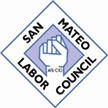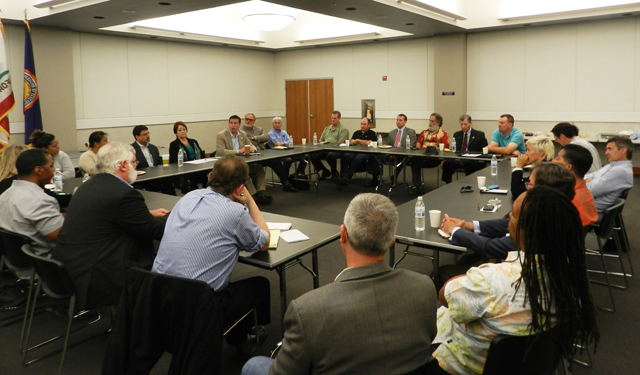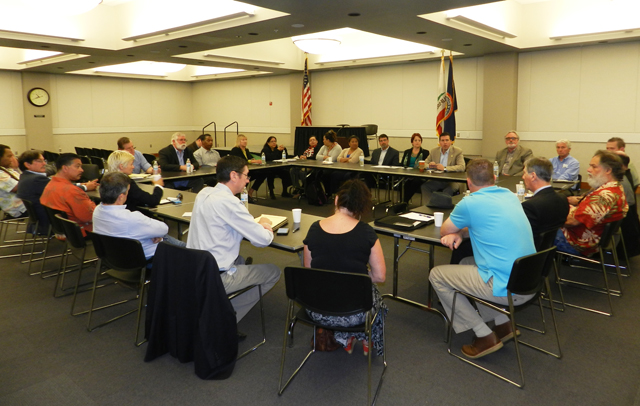


|
|
|
|
|
|
Union Members Discuss Labor Issues with Assembly Member Kevin Mullin
Assembly Member Kevin Mullin met with union members to discuss labor concerns at a meeting organized by the San Mateo County Central Labor Council June 6. Mullin was asked about his positions on the state budget, education funding, and problems at the San Mateo County Events Center and SF International Airport. AFSCME Local 829 Senior Business Agent Nadia Bledsoe asked Mullin to support bills that would fund more staff at state prisons and hospitals. Bledsoe said there are serious safety issues for the workers at the facilities, where there have been assaults by patients with psychiatric problems. AB 2140 would raise staffing levels and AB 1340 would provide that violent offenders receive enhanced treatment. “These are dangerous times and facilities are not staffed appropriately,” Bledsoe said, noting that it has been two years since a nurse was killed by a violent patient at a state facility in Napa County and problems persist. Mullin said he had voted for AB 1340 but that AB 2140 is stuck in the Appropriations Committee. He said it may be brought back next year and he would research the issues. High School teacher Jerry Reed, a member of AFT Local 1481, asked how education funding would be impacted when Prop 30 sunsets. The measure passed in 2012 provides more education funding through a temporary increase in sales taxes. Mullin said it will be a huge challenge to find ways to replace Prop 30 funding and come up with new revenue options. “Prop 30 is one reason we have a $10 billion surplus,” Mullin said. “But we are still in a boom-bust cycle in California.” Mullin noted that, while, “social services have been decimated and need to come back, we also need to pay down the debt.” He said he supported the governor’s plan to establish a rainy day fund to help deal with the impacts of the next crash in the boom-bust cycle. Mullin said the state’s Local Control Funding Formula did restore some funds to local school districts. Mullin commented that wealth disparity is a critical issue and that, “The State is the poster child for income inequality and San Mateo County is at the epicenter.” He said the big challenge is “how do we share prosperity?” Mullin said, “we need to continue the innovation economy but also rebuild the middle class and lift the poor. We need policies that support that, and education can be the equalizer.” Mullin said a centerpiece of his legislation is an effort to get military bases to use clean energy. He said the clean energy projects would be prevailing wage jobs. “Solar City has a bad track record with the unions,” Mullin said. “We need to develop partnerships with the building trades and develop a ‘helmets to hardhats’ kind of program in the state.” Mullin said his plan would provide 100 megawatts of clean energy throughout the state and that he wanted the building trades unions to benefit from the development of clean energy. Leach noted that the building trades agree that education is important and the trades have helped rebuild the middle class through union apprenticeship programs that create career paths. Mullin said he hoped his clean energy bill would help to link the solar industry with labor. “Solar is a growing industry and I want to play a constructive role to bring labor into the industry,” he said. Greg Brown of Machinists Local 1782 said that United Airlines and its contractors at SFO were requiring employees to get their security badges on their own time. Brown said the badges are mandated by the Department of Homeland Security, and workers should be compensated for their time in obtaining or renewing the badges. Brown spoke about the huge inconvenience, travel time, and costs their members face in having to come to SFO during the limited hours the security office is open. Brown said the policy also impacts ports and should be looked at as a state issue, that the legislature could address. Mullin said he will research the issues and see if there is a legislative solution. SMCLC Executive Secretary-Treasurer Shelley Kessler told Mullin, “We see the impacts of the cuts to social services funding at the local level.” Kessler added that labor still has concerns about contracting out of public sector services and jobs. Mullin said he agreed that it was better to keep public services in-house and that contracting out doesn’t save money. He said he had opposed a resolution against contracting out because it contained language that was problematic for the California League of Cities. Mullin said he felt he had to listen to and represent the concerns of the cities who might need to contract out services. He said in specific cases it might be the only option. AFSCME’s Nadia Bledsoe said the union isn’t so much concerned with contracting out a position like city attorney but is worried about contracting out park maintenance and other jobs. She urged Mullin to contact the unions to hear labor’s concerns. Mullin said the resolution was non-binding, but that he would communicate and check with labor about bills that have an impact on local jobs. Joe Toback and Owen Murphy of Sign and Display Local 510 brought up issues at the San Mateo County Events Center. They noted that contractors come in to work events and trade shows, make money and then leave. They often use workers who are not trained to union standards. IBEW’s Mark Leach pointed out that there is also a structural problem with the board that runs the SMEC, which oversees the County Fair but allows the SMEC director to run the Expo Center like a private business. Leach said there needs to be a solution from the State. Kessler said there should be area standards set that require contractors to pay a fair wage and use union labor. Ed Evans of Carpenters Local 217 pointed out that workers hired by contractors through Labor Ready are not trained to the level of workers trained through union apprenticeship programs. Owen Murphy commented that, “Unions have contributed to the growth of the trade shows, but private contractors make a profit and then leave.” The issue of raising the minimum wage or enacting a living wage in San Mateo county was also discussed. Assemblymember Mullin said the County is doing well financially because of Measure A and high property values. “The time is right to have this conversation,” he said. “Living in San Mateo county is increasingly challenging. I want to be tuned in to this.” Mullin pointed out that even a $15 an hour minimum wage is only $30,000 a year and is still low. Mullin added that he wanted to be more proactive and engage with labor, and thanked the union members for having the conversation. - Paul Burton
|
|||||




